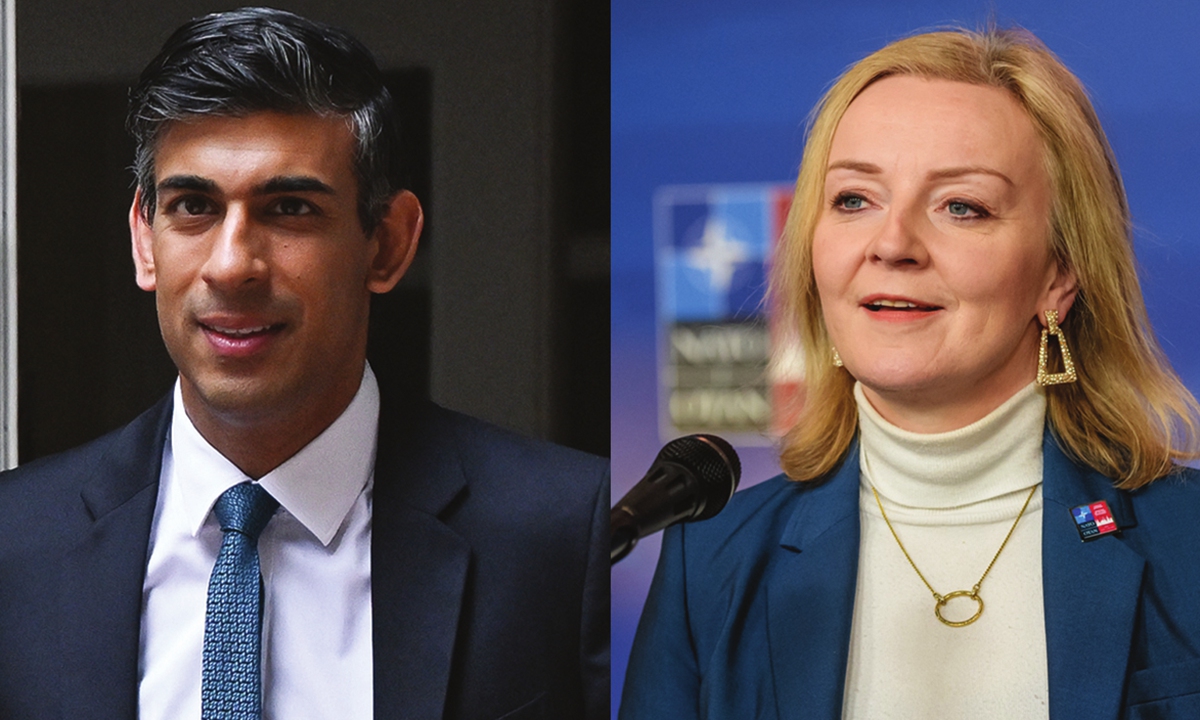
UK's former chancellor of the exchequer (finance minister) Rishi Sunak (left) and Foreign Secretary Liz Truss Photo: GT
As UK's Conservative Party leadership race has narrowed the candidates for prime minister down to former chancellor of the exchequer (finance minister) Rishi Sunak and incumbent Foreign Secretary Liz Truss, Chinese observers on Thursday said a new British leader could open a window for adjustment to bilateral relations, but if the UK keeps following the US' suit, its own people are going to suffer more.
Sunak maintained his lead on Wednesday (British time), winning 137 votes, followed by Truss' 113 votes. Minister of Trade Policy Penny Mordaunt, who previously led Truss, lost out with 105 votes, CNN reported.
About 160,000 rank-and-file party members will have their say on the party leadership, with the winner of the race for the new prime minister announced in September.
Sunak, who is of Indian descent and in his early 40s, has served as finance minister (2020-22) and chief secretary to the treasury (2019-20). He was prominent in the government's financial response to the COVID-19 pandemic and its economic impact.
Sunak resigned on July 5, citing the economic policy differences between himself and former prime minister Boris Johnson. His resignation led to a mass exodus of ministers from the Johnson administration.
Sunak has an economic and finance background, and his policies could be more pragmatic. Such pragmatic principles could be applied to his foreign policy, including Briton's relations with China, Zhao Junjie, a research fellow at the Chinese Academy of Social Sciences' Institute of European Studies, told the Global Times on Thursday.
In July 2021, Sunak used his annual Mansion House speech to insist that Britain beef up its trading relationship with China. He urged a "mature and balanced relationship" with Beijing and had complained that the debate on China "lacks nuance."
There are not many reports about Sunak's remarks on China's Hong Kong- and Xinjiang-related affairs, in contrast to the other candidate Truss, who has repeatedly attacked China over these topics and has been described as a China hawk by both media and observers.
Truss formulated the so-called network of liberty strategy as a way of containing China's rise, and said in a recent interview with Spectator that "we've refocused on foreign policy, on the network of liberty, and are taking a much tougher stand on both Russia and China."
Cui Hongjian, director of the Department of European Studies at the China Institute of International Studies, told the Global Times on Thursday that whoever wins, the new prime minister's priorities should be repairing the party's scandal-marred image and solving domestic problems, including raging inflation.
On the UK's relationship with China, the new government is anticipated to seek interests from economic ties while being hard-line on politics and security, Cui said. Sunak's business background means he might be more flexible in dealing with China, while Truss will talk more about values, he said.
Zhao noted that Truss' provocative remarks against China have left her with very limited room to adjust her China policy, while Sunak could be more nuanced. But whatever remarks they had made before, it is important to observe what the new prime minister will do when in office.
Trade Minister Mordaunt, who has recently made multiple hawkish remarks against China, ultimately lost to Truss in Wednesday's race after taking the lead, which also demonstrated that China policy may not be an effective tool for winning approval at the moment, according to observers.
Whoever secures the post needs to fix domestic problems to ensure sustainable leadership and governance against the backdrop of the Tory's declining popularity after 12 years in power, they said.
Pointing out a deeper problem in British politics behind the bumpy China-UK ties, Zhao noted that Brexit was a difficult moment but also an opportunity for the UK to become more independent in its policies, including in diplomacy, but Westminster and 10 Downing Street had looked to the White House rather than figuring out a path of its own.
The UK has fully coordinated with the US in their strategic goals, forgetting the needs and interests of the British people, he said.
Carlos Martinez, a British author and independent political commentator, wrote in an opinion piece for the Global Times that Britain has essentially outsourced its foreign policy to Washington, going along with new cold war policies against China and Russia -policies that serve the interests of the US military-industrial complex but run directly counter to the interests of ordinary people in Britain.




